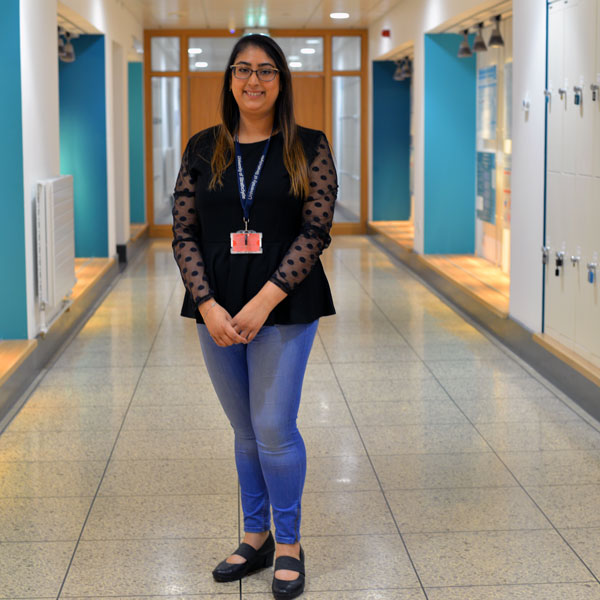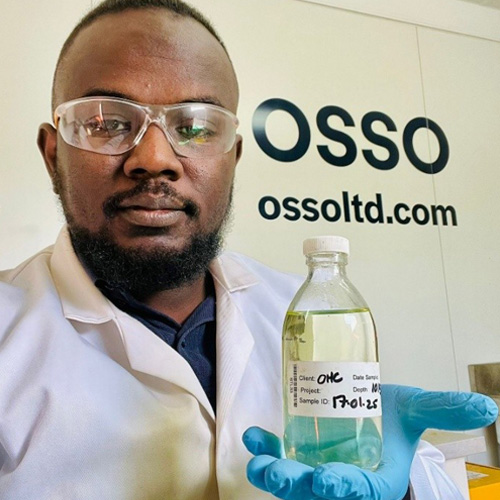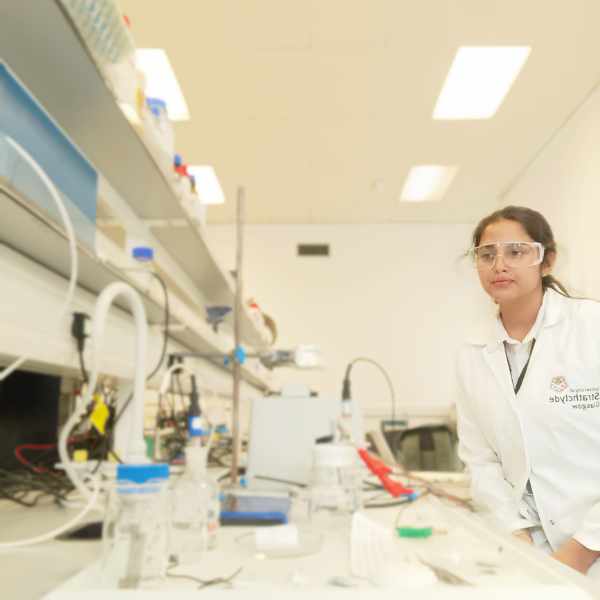| Dr Edward Brightman |
- electrochemical energy devices
- redox flow batteries: novel chemistries
- hydrogen fuel cell diagnostics
- water electrolysis technologies
|
| Dr Iain Burns |
- laser induced fluorescence
- cavity ring-down spectroscopy
- laser induced incandescence
- light scattering
- combustion
- laminar flames
- temperature measurement
- trace gas detection
- soot and polycyclic aromatic hydrocarbons
- direct flame fuel cells
- crystallisation
|
|
Dr Javier Cardona Amengual
|
- artificial Intelligence applied to chemical and pharmaceutical processes
- monitoring and control of continuous manufacturing processes
- deep Learning video/image analytics and data fusion in multi-sensor setups
- digital Twins and multi-scale modelling of chemical processes (from the molecular to the macroscopic scale)
- precision Agriculture for crop management
|
|
Dr Yi-Chieh Chen
|
- development and applications of a range of optical spectroscopic techniques for complex chemical processes and materials
- in-line, non-destructive measurement for in-situ, real-time analysis of chemical processes
- development, scale-up, control and optimisation of chemical manufacturing
- development of a novel measurement-analysis platform to facilitate in-line process monitoring and analysis
- developing novel in-line spectroscopic systems and probes, coupled with the innovative use of physical models and data-driven analysis, to achieve the non-destructive, in-situ monitoring and control of continuous manufacturing processes
|
| Dr Kate Dobson |
- x-ray tomography to investigate the textures within natural and man-made materials
- state-of-the-art 3D and real time 4D imaging techniques allowing the tracking of the location and interactions between particles or bubbles, to quantify fracture propagation, to capture dissolution or precipitation as it occurs, to observe fluids passing through pore throats, or corrosion, or sintering, or root growth
|
| Prof Ashleigh Fletcher |
- use of a range of nanoporous adsorbents, including activated carbon, zeolites and metal organic framework materials, with particular focus on the adsorption properties of such structures
- development of nanoporous materials for use in biomedical applications
- improved personal protection devices for bio-terrorism applications and integrated decontamination processes by developing an appropriate nanoporous adsorbent possibly with tailored surface character
|
|
Dr Mark Haw
|
- colloids and particulates
- pedagogy of sustainability
- economics and ethics
- imagination and creativity in science and engineering
|
|
Dr Vassilis Inglezakis
|
- water/wastewater treatment
- porous materials
- nanocomposites
- valorisation of CO2 for the production of fuels (simulation)
- adsorption process (including modelling)
- soil pollution and waste management
- current focus is on porous nanocomposites applications in catalytic and non-catalytic reactions, vulnerability of city water systems and applications of chemical engineering in extra-terrestrial environments with particular interest on Mars (simulation).
|
| Dr Karen Johnston |
- sustainable polymer thin films and composites using multiscale modelling
- heterogeneous nucleation from solution and properties of the interface
- adsorption and vibrational spectra using quantum calculations
|
| Dr Miguel Jorge |
- computational design of new nanoporous materials for adsorptive separations, using a multiscale approach from the quantum to the mesoscale level, and based on detailed knowledge of the relationships between synthesis conditions, material properties and performance
- developing new models for adsorption in nanoporous materials, including crystalline materials (e.g., zeolites), amorphous materials (e.g., activated carbons) and hybrid organic-inorganic materials (e.g., metal-organic frameworks or mesoporous organosilicas)
- understanding how molecules self-assemble in solution to yield supra-molecular aggregates like micelles and liquid crystals
- gaining an in-depth understanding of interfaces between two fluids (gas-liquid or liquid-liquid), with particular application to ionic liquids
- developing new methods and molecular models for calculating the solubility of complex molecules, including pharmaceuticals and pollutants
|
| Dr Demosthenes Kivotides |
- mathematical studies of Nonlinear, Statistical and Computational Physics (NSCP)
- previous publications on a wide variety of topics including reacting fluids, superfluids, incompressible flows, plasmas, colloidal suspensions and polymer solutions
|
| Dr Jun Li |
- clean bioenergy technologies, including clean combustion, gasification, pyrolysis, wet waste-to-energy
- production and utilisation of renewable hydrogen/hydrogen-rich syngas for decarbonising industry systems
- development/application of advanced computational fluid dynamics modelling of multiphase reacting fluids
- development and demonstration of innovative, affordable, reliable, and sustainable energy systems
- technoeconomic and environmental assessment of energy/chemical systems
|
| Dr Leo Lue |
- using statistical mechanics to understand and predict how the overall properties of a system, such as its dynamics or structure, are determined by the interactions between its constituent components
- interest in how collisions between granules in a powder affects its overall structure and flow, such as in avalanches or pattern formation in sand dunes, and how bubble stability and interactions lead to the properties of foams
- interests of the group are focused on the role of electrostatics and its coupling to dispersion forces on the interactions and dynamics of colloidal particles (e.g., proteins, polyelectrolytes, micellar aggregates, etc.), a better understanding of the link between microscopic characteristics and macroscopic properties should allow the rational design of new materials and better prediction and control of the behaviour of processes
- the research uses a combination of theory and computer simulation techniques, the theoretical approaches range from integral equation and density functional theories, field theoretic methods, to classical solution thermodynamics and transport modelling, the simulation methods include non-equilibrium molecular dynamics and advanced Monte Carlo methods, as well as continuum modelling through finite difference and finite element methods
|
|
Dr Stephen Lyth
|
- interests involve the use of sustainable nanomaterials for application in hydrogen and energy-related technologies
- development of platinum group metal free (non-PGM) catalysts for example the development of unique ethanol-derived microporous carbon foams which can be doped with nitrogen and/or decorated with transition metals. These can be applied as catalysts for the oxygen reduction reaction (ORR) in fuel cells, or for the carbon dioxide reduction reaction (CO2RR) to generate fuels from CO2
- investigations on microporous carbon foams as adsorbents for hydrogen storage and CO2 separation, coupled with machine leaning techniques to determine which materials properties most affect the amount of adsorbed hydrogen
- synthesis of novel fluorinated carbon nanoparticles which display superhydrophobic properties. As well as investigating the fundamental properties of these materials, we apply them as microporous layers in fuel cells. This leads to significantly improved voltage in the high current density region, due to improved water management
- development of new and sustainable electrolyte membranes based on nanocellulose and applied these in hydrogen fuel cells
- general interest in graphene oxide membranes, solid oxide fuel cells and electrolysers, electron field emission, the hydrogen economy, and critical raw materials
|
|
Dr Paul Mulhern
|
- modelling protein interactions with nanomaterials for the design of diagnostics and therapeutics
- biopolymer simulation and the design of compostable renewable plastics
- materials modelling including nucleation and growth at surfaces and interfaces
- modelling porous materials and media for applications in pharmaceutical processing
- director of the ARCHIE-WeSt High Performance Computer Centre
|
|
Dr Dragos Neagu
|
- materials, methods and concepts in solid-state physical chemistry of oxide materials and nanomaterials
- design and preparation of new functional oxide materials and devices for various energy conversion applications, including solid oxide fuel/electrolysis cells, catalysis (oxidation reactions, hydrocarbon catalysis), redox conversion for hydrogen or syngas production
- electrochemistry, electrochemical devices and processes
- cation and oxygen nonstoichiometric perovskite oxide materials
- surface and bulk structure and properties of materials by diffraction, spectroscopy and electron microscopy
- structure-property correlations in complex systems for (electro)catalytic applications
- hyphenated, in situ or operando techniques for understanding structure-property-application correlations
- materials chemistry and engineering solutions for renewable energy and sustainability
- data visualization, communicating science
|
|
Victoria Outram
|
- fermentation process development to facilitate more sustainable manufacturing routes
- research into fermentation intensification to increase the process productivity and efficiency
- using process design to overcome microbial limitations such as toxicity and inhibitions.
|
|
Prof Sudipta Roy
|
- electrochemistry and electrochemical engineering to fabricate novel materials and processes at the micro- and nano-scales, the applications of my research are in corrosion mitigation, manufacturing micro and nano devices for electronics and implants, the removal of toxic substances from effluents and energy applications
- development of processes which employ green hydrogen or its derivatives to manufacture materials of the future, and also transitioning into the decarbonised world
- in general investigation of the principles of green chemistry for sustainable process development with applications to aerospace and electronics sectors as well as decarbonised chemicals and materials through green extraction processes
- majority of research is experimental, with the use of specialised models and digitalisation to understand the process
|
|
Prof Jan Sefcik
|
- our research expertise is in particle engineering and nanostructured materials, with focus on design of novel particulate products and efficient processes for their manufacturing, across a wide range of applications from nucleation and crystallisation, to protein and peptide self-assembly, to organic gels and nanocomposites.
- our research in pharmaceutical manufacturing aligned with CMAC seeks to enhance access to medicines by increasing quality and reducing costs with the aim improving people’s health and wellbeing.
- we develop experimental workflows for product and process development of particulate systems for pharmaceutical applications to obtain better control of critical quality attributes in medicines manufacturing.
- we also develop new methods for extracting valuable real time information from process analytical tools such as imaging and scattering/backscattering to enable intelligent decision support for monitoring and control of particulate systems and processes, including fouling detection and accurate quantitative estimates of particle shape and size distributions from in situ measurements
|
|
Sara Velasquez
|
- development of bioinspired and bio-based polymeric materials to address societal applications
- valorisation of waste to turn it into valuable polymeric materials
|
|
Rashmi Gangasa Walvekar
|
- development of advanced/hybrid 2D materials for energy storage
- development of stable nanofluids to enhance energy efficiency
- Deep Eutectic Solvents for waste extraction (waste rubber tyres, LiB recycling etc)
- microwave synthesis
- hydrothermal synthesis
- ultrasonic dispersion
- phase change materials – eutectic salts for thermal energy storage
- plastic upcycling
|
|
Dr Xiaolei Zhang
|
- decarbonisation, wastes valorisation towards a circular economy
- liquid transportation fuels and value-added chemicals from organic solid wastes, e.g. biomass
- advanced carbon materials (e.g., carbon nanotubes, mesoporous carbon) from polymeric wastes (e.g., plastics, composites)
- biochar, its utilisation, activation, and functionalisation
- photosynthesis for water splitting to produce green hydrogen and CO2 reduction to high-value renewable fuels
|









